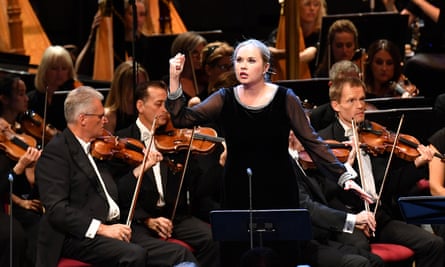‘The tragedy of an entire nation,” is how the conductor Semyon Bychkov describes Khovanshchina, Mussorgsky’s magnificent, if flawed, opera about the nature of autocracy and the consequences of political reform. Coherent narrative is not its strong point, but it dramatises the aftermath of Peter the Great’s modernisation of Russia in the 1680s, focusing on the destruction of three groups that stood in the tsar’s way: the Khovansky family, leaders of a dissolute army in control of Moscow; the circle around the corrupt politician Golitsyn; and the Old Believers, a schismatic Orthodox sect led by Dosifey, an aristocrat turned visionary, a bit like Tolstoy. It is bleak stuff, grimly prophetic of 20th-century totalitarian catastrophe.
Mussorgsky left the score unfinished at his death in 1881; for many years, the opera was usually given in Rimsky-Korsakov’s edition, used at the 1886 premiere. With the BBC Symphony Orchestra on exemplary form, however, Bychkov opted for Shostakovich’s more austere version that was first heard in 1960. His interpretation was magisterial, measured and for the most part relentless. We were reminded throughout of Mussorgsky’s sense of ritual theatre – the alternation of solos and dialogues with vast choruses that gives the work the inexorability of classical tragedy. Occasionally, he might have pressed forward with greater urgency: the tension sagged at the start of Act V when the Old Believers prepare to commit mass suicide. But the difficult second act, which brings together Khovansky (Ante Jerkunica), Golitsyn (Vsevolod Grivnov) and Dosifey (Ain Anger) for an almost Dostoevskyan ideological wrangle, had superb clarity and force.

There wasn’t a weak link in the cast. Jerkunica presented us with a formidable portrait of a man whose innate arrogance takes on qualities of existential defiance as his world collapses round him. Anger’s noble yet inflexible authority contrasted sharply with Grivnov’s slippery duplicity. Elena Maximova, with her dark mezzo, was an outstanding Marfa, tragically in thrall to Christopher Ventris’s sensualist Andrey. George Gagnidze’s Shaklovity had all the cunning of the born survivor. There was choral singing of great splendour from the combined forces of the BBC Singers and the Slovak Philharmonic Choir. The flame effects at the end, as the Old Believers perish, were awkward and ineffectual, but full marks to the Proms for finally giving us surtitles, much needed in this most complex of works.

Comments (…)
Sign in or create your Guardian account to join the discussion